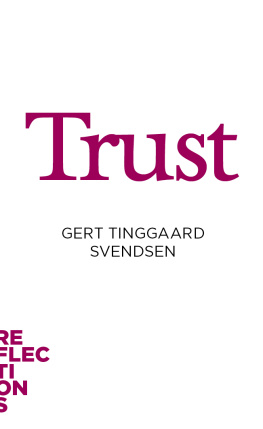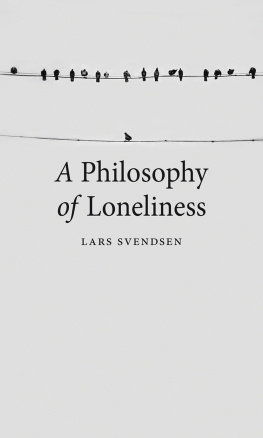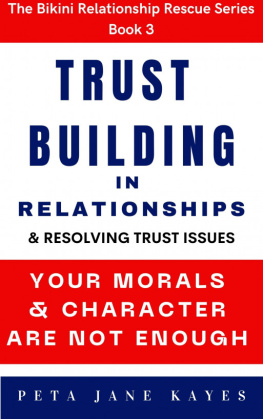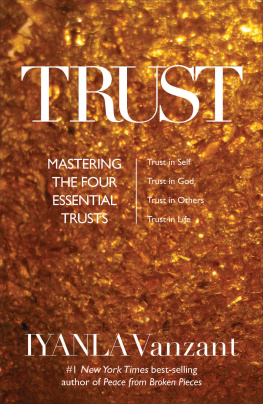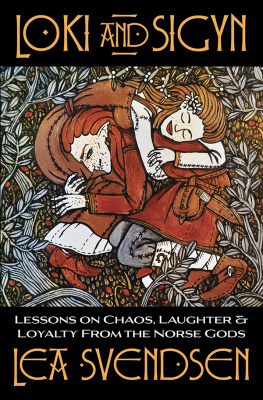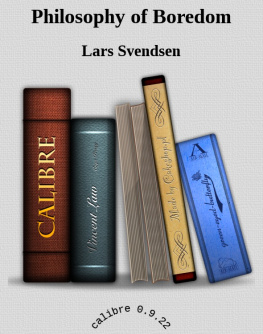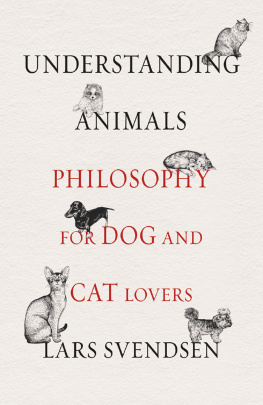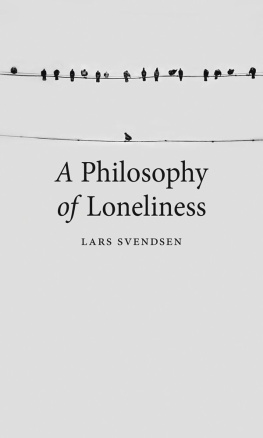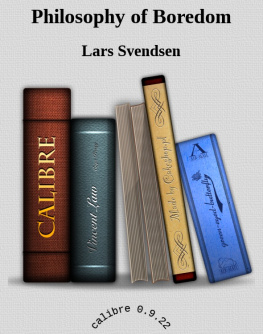Svendsen - Trust
Here you can read online Svendsen - Trust full text of the book (entire story) in english for free. Download pdf and epub, get meaning, cover and reviews about this ebook. year: 2014, publisher: Aarhus University Press, genre: Politics. Description of the work, (preface) as well as reviews are available. Best literature library LitArk.com created for fans of good reading and offers a wide selection of genres:
Romance novel
Science fiction
Adventure
Detective
Science
History
Home and family
Prose
Art
Politics
Computer
Non-fiction
Religion
Business
Children
Humor
Choose a favorite category and find really read worthwhile books. Enjoy immersion in the world of imagination, feel the emotions of the characters or learn something new for yourself, make an fascinating discovery.
- Book:Trust
- Author:
- Publisher:Aarhus University Press
- Genre:
- Year:2014
- Rating:3 / 5
- Favourites:Add to favourites
- Your mark:
- 60
- 1
- 2
- 3
- 4
- 5
Trust: summary, description and annotation
We offer to read an annotation, description, summary or preface (depends on what the author of the book "Trust" wrote himself). If you haven't found the necessary information about the book — write in the comments, we will try to find it.
Trust — read online for free the complete book (whole text) full work
Below is the text of the book, divided by pages. System saving the place of the last page read, allows you to conveniently read the book "Trust" online for free, without having to search again every time where you left off. Put a bookmark, and you can go to the page where you finished reading at any time.
Font size:
Interval:
Bookmark:
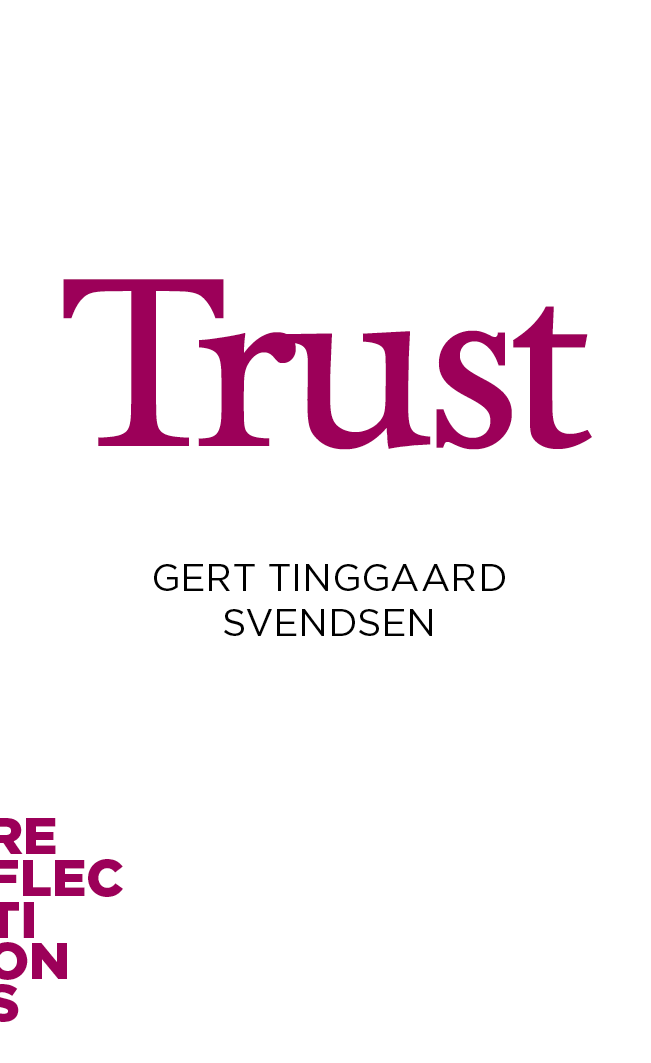
Reflections 1
TRUST by Gert Tinggaard Svendsen
Reflections 2
POSITIVE PSYCHOLOGY by Hans Henrik Knoop
Trust
GERT TINGGAARD SVENDSEN
RE
FLEC
TI
ON
S
TRUST
Reflections 1
Gert Tinggaard Svendsen 2014
Layout and cover: Camilla Jrgensen, Trefold
E-book: Narayana Press, Gylling, Denmark
ISBN 978 87 7124 403 8
Reflections

It is early morning and the sun is rising over the dead calm Kattegat, the sea that separates Denmark from Sweden. There is an atmosphere of perfect peace and quiet. My family and I are camping on the Danish island of Ls with my younger brother, Gunnar, and his family. Every year we all go camping on a Danish island to explore our island nation the ocean blue kingdom.
The island of Ls epitomizes Danish hygge and is probably our most peaceful destination so far. Danish hygge denotes a convivial way of spending time together that celebrates sameness. We dont have to worry about theft, vandalism or other unpleasant things. Nor do we need to hide our valuables, and we leave our tents and cars unlocked. Camping arrangements were made over the phone. We didnt have to fill out any forms or send our encrypted credit card number via the internet. We pay for our stay when we leave. In principle we could sneak away early in the morning without paying, but that would never occur to us or to any of the other campers. This is a safe, comfortable and peaceful place. When the children wake up, they play on the beach and roam the campground. When the babies get tired, their parents leave them to sleep in their baby carriages.
In former Prime Minister Poul Nyrup Rasmussens words,  you rarely see a Dane with a knife in one hand without a fork in the other. This statement is epitomized on Ls. Here it is safe to turn your back on a stranger without harbouring fear of being stabbed in the back.
you rarely see a Dane with a knife in one hand without a fork in the other. This statement is epitomized on Ls. Here it is safe to turn your back on a stranger without harbouring fear of being stabbed in the back.
Immediately after my vacation I go to a conference in South Africa, and I travel directly from the peaceful island of Ls to Durban, the second largest city in South Africa.
As soon as I get off the plane I feel that something is radically different. There are armed guards everywhere, and everybody clutch their bags and belongings. Already on the first day, I have to adjust my view of other people to make sure my life doesnt become very short and hectic. The receptionist instructs me not to open the door to my hotel room when somebody knocks. Instead, I have to hide all valuables, ask who is at the door and then call reception. If they can vouch for the person, I may open the door. I realize that I am wondering whether I will be assaulted when I approach a stranger in the halls outside my hotel room.
This probably makes sense. I am visiting a society with a corrupt and absent police force, and lawlessness is rife in the streets and maybe also in the hotel hallways.
The first day at the conference there is an outbreak of panic because many participants are assaulted. The thugs wait outside the hotel and chase hotel guests who venture outside carrying valuables. One sits on top of the victim holding a knife to his throat while the other searches the pockets. Like the typical camper on Ls, these thugs do have a knife in their hand; but they sure do not have a fork in the other. After many protests and cries for help from the participants, the organizers order a bus for the next day, so that we can run from the hotel lobby to the bus and thus avoid assaults. We look like a bunch of horrified lemmings squeezing into the bus.
I have not done any research on South Africa, and do not know the country beyond these personal experiences, but it obviously has far-reaching consequences that you should constantly fear others and protect yourself against them. It is not easy to protect all valuables at all times; the constant precautions require a lot of energy. It would be insane to behave in Durban as you did on Ls, letting your kids run free or take a walk on the beach after dark.
I think many of us remember the young mother from Copenhagen who in 1997 left her 14 month-old daughter asleep in a baby carriage outside a caf in New York. The mother could watch the girl through the window, while she was having lunch. However, someone called the police, who immediately took the child and arrested the mother. She pleaded to see her daughter, but she was taken to the police station, searched and chained in a cell, while she could hear her baby cry.
The mother was released with a warning and was reunited with her baby. She did not realize that in the US it is regarded as deeply irresponsible to leave a baby on the street in a baby carriage. In court she argued that it is a tradition in Denmark to let babies sleep outside the cafs and that we do not fear kidnapping, etc. One known instance from Denmark of someone stealing a baby carriage with a baby is from 1978, when a mentally disturbed woman pushed a baby carriage a few blocks and the baby was not harmed.
But how should we interpret the difference between leaving a baby carriage outside a caf in New York and outside a caf in Copenhagen? And what are the societal consequences of the differences in this respect in Durban and on Ls? It took a trip from Aarhus to Washington before I discovered my research field.
In the mid-1990s, I was a visiting student at Maryland University in Washington, DC. My American supervisor, Mancur Olson, and his colleagues repeatedly asked me why Denmark and the other Scandinavian countries performed so well both economically and socially.
I also met the Nobel Prize winner Douglas North, who talked about the importance of a societys institutions and norms. He was, like Olson, Wallace Oates, Barry Weingast, and other famous economists, very interested in solving what they called the Scandinavian puzzle. What is special about Scandinavia, they asked. How is it possible? Did we have some special, secret raw material or what, they wondered. I was somewhat annoyed. I had come to the US to study American conditions, and had a hard time seeing how Denmark was particularly interesting from an economic and sociological angle. And needless to say my inability to answer their questions was a bit awkward.
When I returned to Denmark, I kept thinking about their insistent questions, and I too began to wonder and search for an explanation. I stayed in contact with Mancur Olson, and his enthusiasm and contagious energy pushed my work in a fruitful direction. In the mid-1990s, Mancur Olson became leader of a large World Bank research project about the concept social capital, concerning the value of social networks. More precisely, he had to find out how social capital could be applied in developing countries.
Along with Danish professors Martin Paldam and Peter Nannestad, I was fortunate to become a member of the steering group for the project. It was an unforgettable experience with Olson at the helm. He was extremely inventive and a great motivator. Always active, always eager to discuss any subject. It says a lot about Mancur Olson as a person that Maryland University after his death dedicated a bench to the man who couldnt sit still.
I was inspired by the results of the project and it struck me that 
Font size:
Interval:
Bookmark:
Similar books «Trust»
Look at similar books to Trust. We have selected literature similar in name and meaning in the hope of providing readers with more options to find new, interesting, not yet read works.
Discussion, reviews of the book Trust and just readers' own opinions. Leave your comments, write what you think about the work, its meaning or the main characters. Specify what exactly you liked and what you didn't like, and why you think so.

